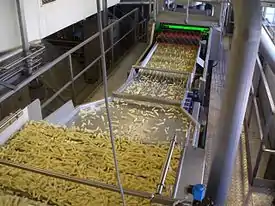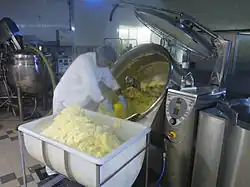Potato processing industry
The potato processing industry or potato processing market refers to the sector involved in transforming potatoes into various food products and by-products through different manufacturing processes. This industry plays a crucial role in meeting the global demand for potato-based foods, such as potato chips, french fries, mashed potatoes, and dehydrated potato products. The potato processing industry encompasses various activities, including cleaning, peeling, cutting, blanching, frying, freezing, and packaging. With its significant economic impact and contribution to the food industry, the potato processing industry serves as a vital link between potato growers, manufacturers, and consumers worldwide.[1]

History
The origins of potato processing can be traced back to ancient times before Columbus arrived in the Americas. During this prehistoric period, people used drying techniques to preserve potatoes, reduce their size, and create flour and alcoholic beverages. As the potato became a widely consumed crop worldwide, processing methods were developed for various purposes. Initially, these methods were focused on providing sustenance for sailors and soldiers, but later expanded to meet the needs of aviation, convenience, and indulgence.[2]
Frozen potatoes

Frozen potatoes have been among the biggest types of processed potatoes which are consumed. This is due to the convenience they offer in terms of preparation time and flexibility. They have a long shelf life and the vitamins and other nutrients are preserved in them. Frozen potatoes, as well as the different products, are obtained by processing fresh potatoes with advanced equipment at very low temperatures. They are also available in different forms, such as hash brown, French fries, shapes and mashed potatoes and also in the form of topped or stuffed potatoes and other forms. The products are consumed either in fast-food restaurants or by individual customers who buy them in retail stores.
The Netherlands and Belgium are the two top producers of frozen potato products in Europe. Last year, Europe produced 3.8 billion euros worth of deep-frozen french fries. About one-third came from Dutch manufacturers (nearly 1.3 billion euros), which amounted to over 1.6 million tonnes, or a weekly supply of ten French fry cone holders of 175 grams per Dutch resident.[3][4]
Largest frozen potato companies by production size and revenue
| Company name | Founded | Production locations | Production size (tonnes) |
Employees | Revenue |
|---|---|---|---|---|---|
| McCain Foods | 1957 | 47 facilities | 22,000 (2020)[5] | ||
| Lamb Weston | 1950 | 6 in Europe | 0.8 million (by the 6 European plants) |
7,200 (2018) | |
| Aviko | 1962 | ||||
| Agrarfrost Holding GmbH & Co | 1967 | ||||
| Agristo NV | 1985 | ||||
| Globalfries | 1966 | ||||
| Simplot | 1923 | ||||
| Cavendish | 1980 | ||||
| Ecofrost Inc. | 2003 | ||||
| Farm Frites International B.V. | 1971 | 6 | 1.5 million | 1,500 |
Additional companies
- Kraft Heinz's Ore-Ida brand. The name "tater tot" is a registered trademark of the American frozen food company Ore-Ida, but is often used as a generic term.[7]
References
- "Potato Processing Global Market Report 2023". Yahoo Finance. March 16, 2023. Archived from the original on June 5, 2023. Retrieved June 28, 2023.
- "Archived copy". Archived from the original on 2022-09-27. Retrieved 2023-06-28.
{{cite web}}: CS1 maint: archived copy as title (link) - Netherlands, Statistics (October 4, 2016). "Netherlands, Belgium largest french fries producers". Statistics Netherlands. Archived from the original on June 3, 2023. Retrieved June 28, 2023.
- "What is our production of frozen fries? - The Netherlands in Numbers 2020 | CBS". What is our production of frozen fries? - The Netherlands in Numbers 2020 | CBS. Archived from the original on 2023-06-03. Retrieved 2023-06-28.
- "Our business brands". Archived from the original on July 23, 2020. Retrieved August 4, 2020.
- "JR Simplot". Forbes. Archived from the original on 2023-02-21. Retrieved 2023-06-28.
- Elliott, Stuart (2014-08-25). "Ore-Ida Campaign Focuses on Authenticity of Tater Tots". The New York Times. Retrieved 2016-05-14.
Tater Tots became successful enough that the brand name grew to be synonymous with the product, a delightful dilemma shared with other brands that pioneered a product category, among them Band-Aid, Kleenex and Xerox.